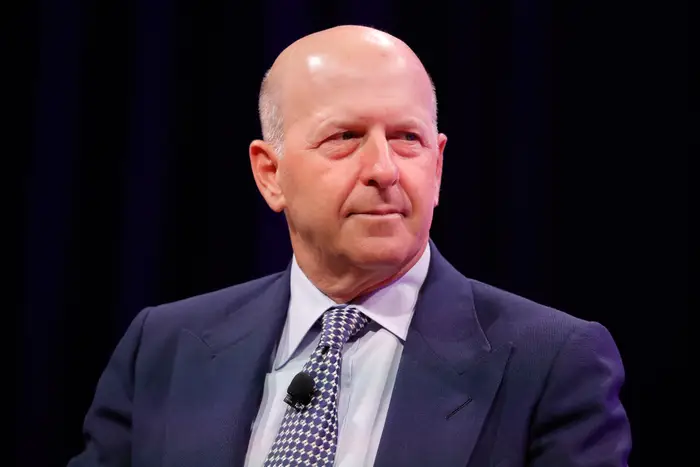BlackRock’s next high-stakes bet: lending out cash

- BlackRock is looking to double revenue from its private-markets business in five years.
- Key to that plan is the hot private-credit market, where borrowers face hefty interest payments.
- The firm bets that lending to midsize companies will be a source of growth. It won’t be easy.
When a $1.5 billion wealth management firm in New Jersey set out this summer to evaluate different money managers in search of new private-credit investments, the team discovered more than they expected.
“We were surprised to see how many came back to us and said they had either just launched a private BDC, or were planning to launch one in the next 60 to 90 days,” said David Goldstone, manager of investment research at Condor Capital Wealth Management. Goldstone was referring to a type of business-development company, which is a popular investment vehicle in the private-credit market.
The flood of new funds demonstrates Wall Street’s latest obsession. Firms are racing to win over investors seeking to place money in the hot private-debt market, where lenders have the upper hand and borrowers face hefty interest payments, with interest rates in the US at a two-decade high.
Condor has had its eye on this market for quite some time, initially allocating to BDCs in 2020. Among the numerous investments it considered that year, the firm chose a publicly traded BDC managed by a smaller private debt player known for its size: BlackRock.
While BlackRock is the world’s largest asset manager in mutual and exchange-traded funds, it is still working to gain a foothold in the competitive private-credit market. Condor’s allocation is part of BlackRock’s $81 billion private-credit business, which is part of the company’s larger $317 billion alternative-assets platform.
For years, BlackRock has prioritized expanding its portfolio of alternative investments, such as real estate and private debt. In the year 2000, BlackRock made its first direct lending transaction in the United States through an institutional fund. However, with higher interest rates providing investors with the opportunity to earn double-digit returns outside of the public market, it has recently increased its lending efforts.
It will not be easy. BlackRock lacks the scale of pure-play private-markets firms that dominate the space, and it is competing for the best deals in an asset class that has yet to be tested by a prolonged economic downturn.
Despite the fact that more wealth managers and institutions such as endowments are looking for larger private-debt allocations, competition for deals is fierce. It remains to be seen how well any lender that has recently become overly reliant on private credit will fare if the Federal Reserve cuts interest rates in 2024, as analysts and economists predict.
Due to years of downward pressure on the fees that firms can charge for basic public-market stock and bond funds, BlackRock and traditional managers such as Fidelity, T. Rowe Price, and Franklin Templeton have set out to expand their lucrative alternative-asset offerings. While alternatives account for only 3% of BlackRock’s total assets, they generate 11% of the firm’s revenue. This summer, BlackRock stated that it hoped to double its private markets business revenue to $1 billion by the end of 2022 in the next five years.
It is competing with private-markets firms, as well as traditional asset managers, to provide loans primarily to midsize businesses. Apollo, Blackstone, and KKR manage credit businesses with assets totaling $450 billion, $297 billion, and $227 billion, respectively. (KKR is a major shareholder in Insider’s parent company, Axel Springer.)
According to Greg Greifeld, deputy chief investment officer and head of credit at venture-debt firm Runway Growth Capital, BlackRock’s push into private credit is a “stamp of approval” for the industry, reflecting how much the asset has evolved and the room for growth that remains.
“In order to move the needle, BlackRock likely needs a line of sight into an ability to raise tens, if not hundreds, of billions of assets under management,” Greifeld said in a statement.
This year’s efforts by BlackRock, including plans to merge two BDCs and reorganize teams internally, demonstrate that even an investment supermarket must diversify into more lucrative private-markets deals. A renewed focus on private credit at the world’s largest asset management firm reflects the fact that the face of whom corporate America owes money is rapidly changing, moving beyond banks and even private-equity firms.
“BlackRock has a lot of catching up to do,” said Tim Clarke, PitchBook’s lead analyst covering private equity.
He cited the competition: Significant portions of the assets or fundraising of the largest publicly traded alternative-fund managers are now in private debt.
“It is dominant. “These are no longer private-equity managers,” he said. “They’re private-credit managers.”
‘Size matters’
During an investor day presentation this summer, BlackRock executives teased out their overall focus on private credit and fixed income. The firm’s president, Rob Kapito, stated that he has “never, ever been more excited about investing in fixed income than I am today.” He described today’s interest rates as a generational shift, saying, “We’ve been waiting for this for a very long time.” “Go out there and begin investing.”
Individuals are. According to PitchBook and LCD data, the global private-credit market has grown to $1.75 trillion in institutional and retail capital from $504 billion in 2012. This spring’s banking crisis aided the market by forcing borrowers to seek alternative sources of capital in the private markets. Banks, for their part, have been hesitant to make riskier loans since the global financial crisis, when regulators increased the amount of capital required on their balance sheets.
BlackRock’s string of private-credit developments amounts to a long-term bet on the continuation of this dynamic.
“The bottom line is that middle-market companies in the United States are turning to private debt for financing needs, which is increasing both the size of the market and the number of investment opportunities,” said Jim Keenan, BlackRock’s chief investment officer and global head of private debt, in a video posted earlier this month.
This year, the company launched a private-debt fund to fund climate-change strategies and announced plans to merge two publicly traded BDCs, BlackRock TCP Capital Corp. and BlackRock Capital Investment Corp., to form a $1.1 billion vehicle. It reorganized internal alternative-assets groups and named Keenan, a long-time BlackRock executive, to oversee global private debt. It launched a private-credit product for retail investors and acquired the London-based venture-debt firm Kreos Capital over the summer.
“Size does matter. The larger the platform and the greater the consistency, the same personnel or systems are evaluating the same deal flow. That’s why they’re merging,” said Clarke of PitchBook, referring to the BDC merger. “And that’s why they’re hiring new teams and getting started.” These floating-rate debt structures are the only asset class making money in this market.”
BlackRock’s direct lending business in the United States primarily targets middle-market companies with enterprise values ranging from $100 million to $2.5 billion. Chobani, the customer-service software company Zendesk, the financial-software provider Trintech, and the Amazon aggregator Thrasio are among BlackRock’s many borrowers across funds.
“While BlackRock is a strong player in passive asset management, they will face significant hurdles in their attempt to play catch-up in private credit,” said a senior private-credit executive at an investment firm. The executive, who spoke on the condition of anonymity in order to speak freely about their industry and whose identity was revealed to Insider, stated that there were only a few direct lenders with the size to deploy capital at the scale required for major deals.
More acquisitions may be made in the future to gain scale or new capabilities. BlackRock CEO Larry Fink has told analysts this year that he is open to “transformational” transactions.
“When we did the big transactions, there was a lot of market unrest, and I think there is quite a bit going on now — big shifts,” Fink said this month, referring to the purchase of Merrill Lynch and Barclays investment managers more than a decade ago. “And so we are looking at different opportunities related to technology, private markets.”
The ‘paradox’ of private credit
There are numerous risks associated with BlackRock’s and its competitors’ private-credit ambitions. Insider reported last year that BlackRock had difficulty retaining some investment professionals from a previous private-credit acquisition, Tennenbaum Capital Partners, and that in this market, firms are eager to poach competitors’ talent.
Meanwhile, analysts expect default rates to rise from a low base. In a July report, Jared Gross, J.P. Morgan Asset Management’s head of institutional portfolio strategy, stated that private credit existed during a period of low rates, cheap leverage, and limited loan defaults. And it is now adjusting to high interest rates, costly leverage, and rising credit risk.
This viewpoint gets to the heart of what worries financial regulators and bank executives who are concerned about lending shifting to less transparent private credit markets. In a recent report, BlackRock’s investment-institute analysts expressed concern about defaults, stating that while loss rates in private credit had been low, they expected them to “normalize as higher financing costs and stagnant activity take their toll on borrowers,” as they have in public markets.
Condor Capital Wealth Management’s Goldstone, who is bullish on private credit in general, expects more industry turmoil in the coming months and years than in the previous decade. On an earnings call in August, Phil Tseng, BlackRock’s cohead of US private capital, stated that his team had been passing on more opportunities to lend to companies, particularly when deal terms did not provide adequate lender protections.
“Today’s high yields present an opportunity for lenders, but also pose a direct risk to the solvency of borrowers,” Gross of J.P. Morgan said in a statement. “That, in essence, is the paradox of private credit.”






